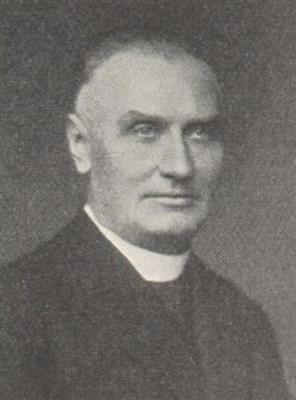Univ.-Prof. Dr. Karl Hilgenreiner

Personalia
Born:
Died:
Profession:
Persecution:
Imprisonment June 1944 - May 1945
Memberships
Curriculum Vitae
Karl Hilgenreiner was born in Friedberg in Hesse. Two years later, his parents moved to Haid in West Bohemia. As a half-Egerlander and half-Hessian (he only knows his original homeland from stories), he is nicknamed "Prussian" by the village children. From 1877 to 1885, he attended the Jesuit-run Episcopal boys' seminary and private grammar school in Mariaschein [Bohosudov] near Teplitz-Schönau [Teplice-Sanov] in northern Bohemia [now the Czech Republic].
After graduating from high school, he went to Rome to study. Here he entered the Collegium Germanicum et Hungaricum and completed his philosophical and theological training. In 1888 he received his doctorate in philosophy and in 1892 his doctorate in theology. On November 1, 1891 he was ordained a priest for the diocese of Litomerice in Rome. This period also saw the promulgation of the first social encyclical of LEOS XIII (1878-1903) "Rerum novarum" on May 15, 1891, the content of which and above all the social question discussed in it made a lasting impression on him from then on and shaped his later life. After years as a chaplain at the parish in Cheb in western Bohemia, he was appointed head of the prince-bishop's boys' seminary in Mies [Stribro - now in the Czech Republic].
As a result of his academic and journalistic activities, he was appointed professor of canon law, Christian social teaching and speculative dogmatics at Karl Ferdinand University in Prague in 1899, later becoming rector. In 1905, the student fraternity Ferdinandea made him an honorary member, followed in 1914 by honorary membership of the student fraternity Saxo-Bavaria.
During the First World War, he was deployed as a field curate and spiritual director of the Prague field hospitals and also had to continue his lecturing activities. After the war and the founding of the Czechoslovak Republic [CSR], Karl Hilgenreiner entered politics and founded the Austrian Christian Social Party, with its representatives Prelate Dr. Ignaz Seipel and Leopold Kunschak with whom he was in personal contact, together with Professor Dr. Robert Mayr-Harting [1926-1929 Minister of Justice] and the Prague Auxiliary Bishop Wenzel Frind (1843-1932), he founded the "German Christian Social People's Party" [DCSV] for the German-speaking population group in the CSR in 1919. He became chairman in 1927 and represented the DCSV in the CSR Senate from 1920 to 1938.
In spring 1938, all non-socialist German parties dissolved and were incorporated into the "Sudeten German Party" [SdP] of Konrad Henlein [1898-1945], whose claim to sole representation was demanded by Adolf Hitler. Because of his open criticism of the occupation of Czechoslovakia, the reprisals of the German occupying power against the church and his advocacy of the rights of the German ethnic group in Bohemia, he was placed under permanent police surveillance. In June 1944, Karl Hilgenreiner was arrested by the Gestapo and, without a hearing, sent to Sasmik, a Franciscan monastery specially converted into a labor camp for clergymen. Franciscan monastery Sasmik [Zasmuky] southwest of Kolin, where he had to stay until the end of the war.
In May 1945, he was released for a few weeks, but was arrested by the Czechs in June on the basis of a denunciation and imprisoned in the Rupa internment camp in Modfany near Prague. After a year, he managed to emigrate to Austria, partly through the mediation of Leopold Kunschak and the Austrian consulate in Prague. Immediately after his arrival in Vienna in the summer of 1946, he worked as a chaplain at St. Charles Church in Vienna. He was also one of the first lecturers at the newly founded Vienna Catholic Academy.
Places
Place of activity:
Citations
Krause, Peter/Reinelt, Herbert/Schmitt, Helmut (2020): Farbe tragen, Farbe bekennen. Katholische Korporierte in Widerstand und Verfolgung. Teil 2. Kuhl, Manfred (ÖVfStG, Wien) S. 121/122.
